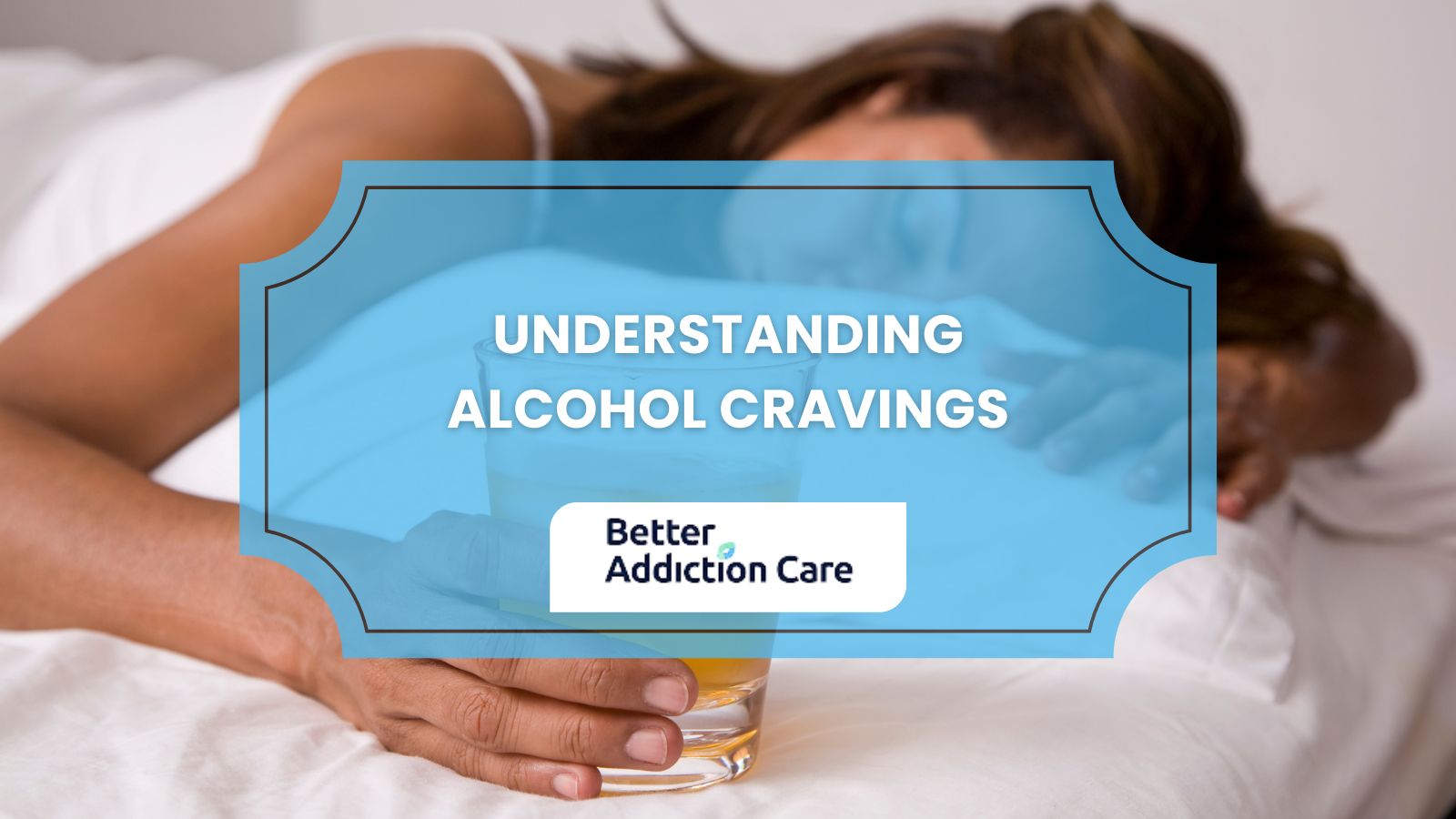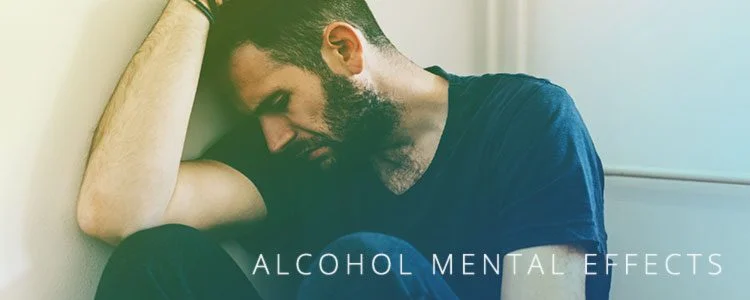Learning How to Help an Alcoholic Friend
To support a friend recovering from alcoholism, use compassionate communication, encourage professional help, practice active listening, set healthy boundaries, and provide consistent encouragement without enabling harmful behavior. Your friend is among 28.9 million Americans who faced Alcohol Use Disorder in 2023—a sobering reminder that this struggle affects millions and that recovery requires tremendous courage.
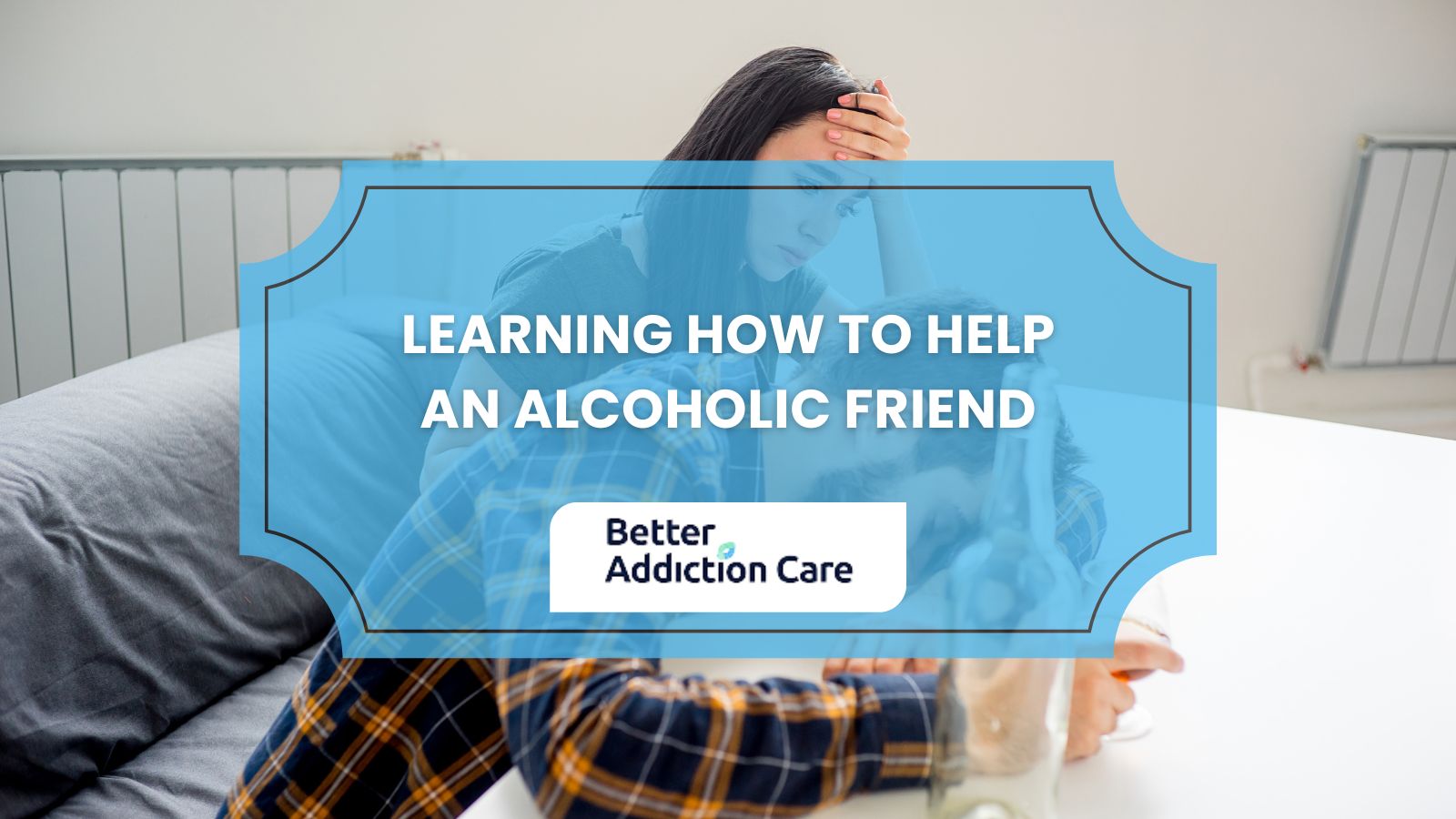
Educating yourself about alcoholism involves consulting expert resources, attending support meetings, listening to personal stories, and engaging with healthcare professionals to understand the condition better and offer informed, empathetic support.
Avoid shaming, blaming, criticizing, or pressuring your friend, and refrain from dismissing their feelings, issuing ultimatums, or enabling their drinking behavior, as these responses hinder trust and recovery.
What Can You Do To Help an Alcoholic Friend With Recovery?
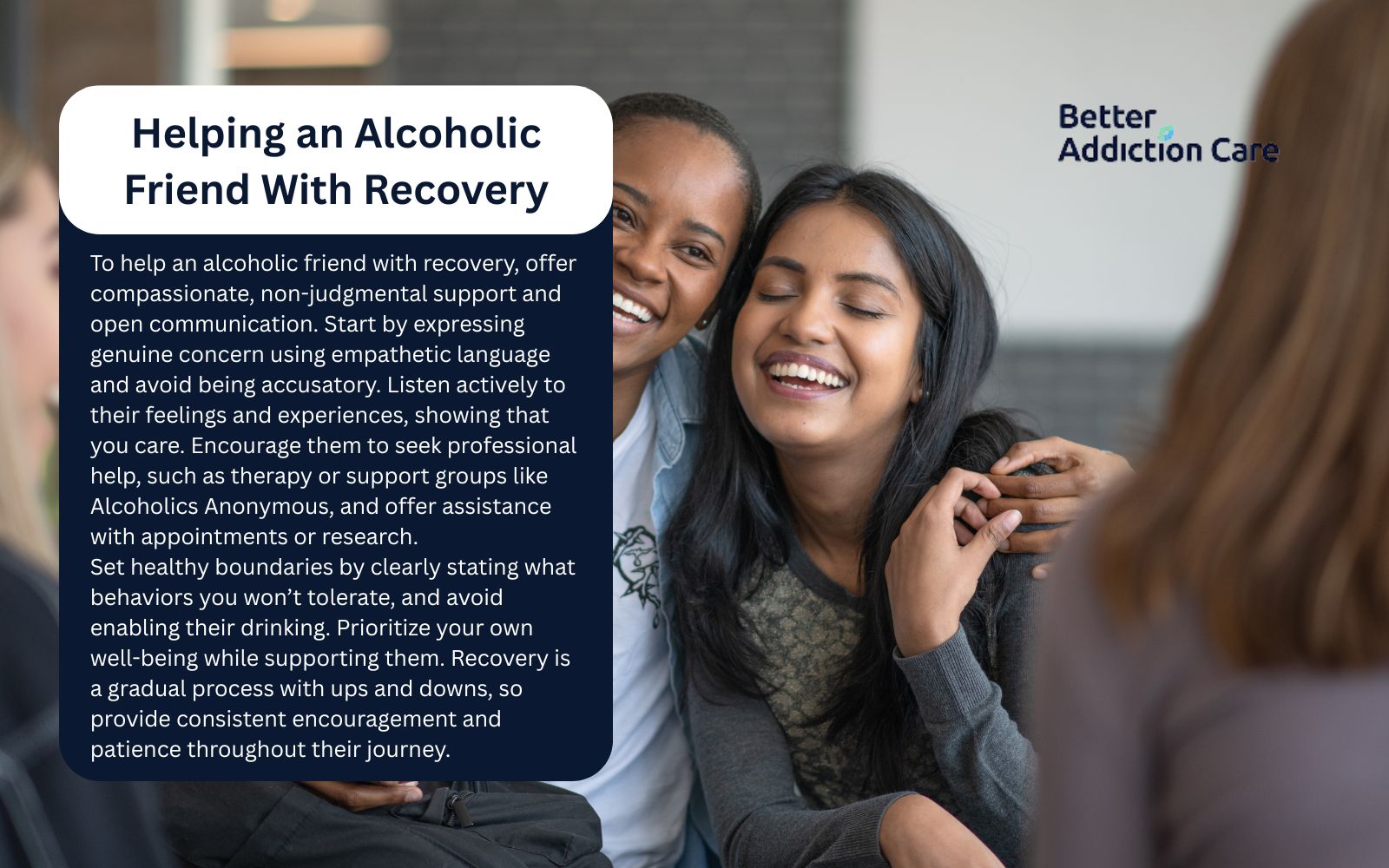
To help an alcoholic friend with recovery, you provide compassionate support through genuine communication, professional guidance, and consistent encouragement throughout their healing journey.
To begin, it would be helpful to engage in a genuine conversation with the person you care about, expressing your genuine concern for their welfare. When addressing their behavior, it's important to avoid using accusatory language. Instead, gently bring up specific points that have bothered you or that you have noticed. It's best to use empathetic language to express your concerns.
Active listening is essential. Encourage them to talk about their feelings, thoughts, and problems with drinking without being afraid of being judged. Acknowledging what they say and how they feel shows that you care and are listening. Being honest with each other is a great way to improve your relationship and set the stage for a helpful talk about getting help.
You help your friend get professional help by suggesting groups like Alcoholics Anonymous, therapy, or counseling. Show that you want them to improve by offering to help them with things like attending appointments and studying treatment options. Also, remember to put your own mental and emotional health first by telling them how important it is for both of you to take care of yourself.
Setting clear limits is important for maintaining good relationships with others while being supportive. As you tell them you'll always be there for them, be clear about what you won't stand for. Disagree with their drinking by avoiding events that involve alcohol or do not help them while they are trying to hide the effects of their drinking.
It is important to remember that alcohol recovery tends to be slow and has its ups and downs; for this, it is crucial to offer support and be there for the person going through it. When you show support and encouragement, the person relies on you for motivation and strength to overcome difficult situations that might arise.
How Can You Educate Yourself About Alcoholism?
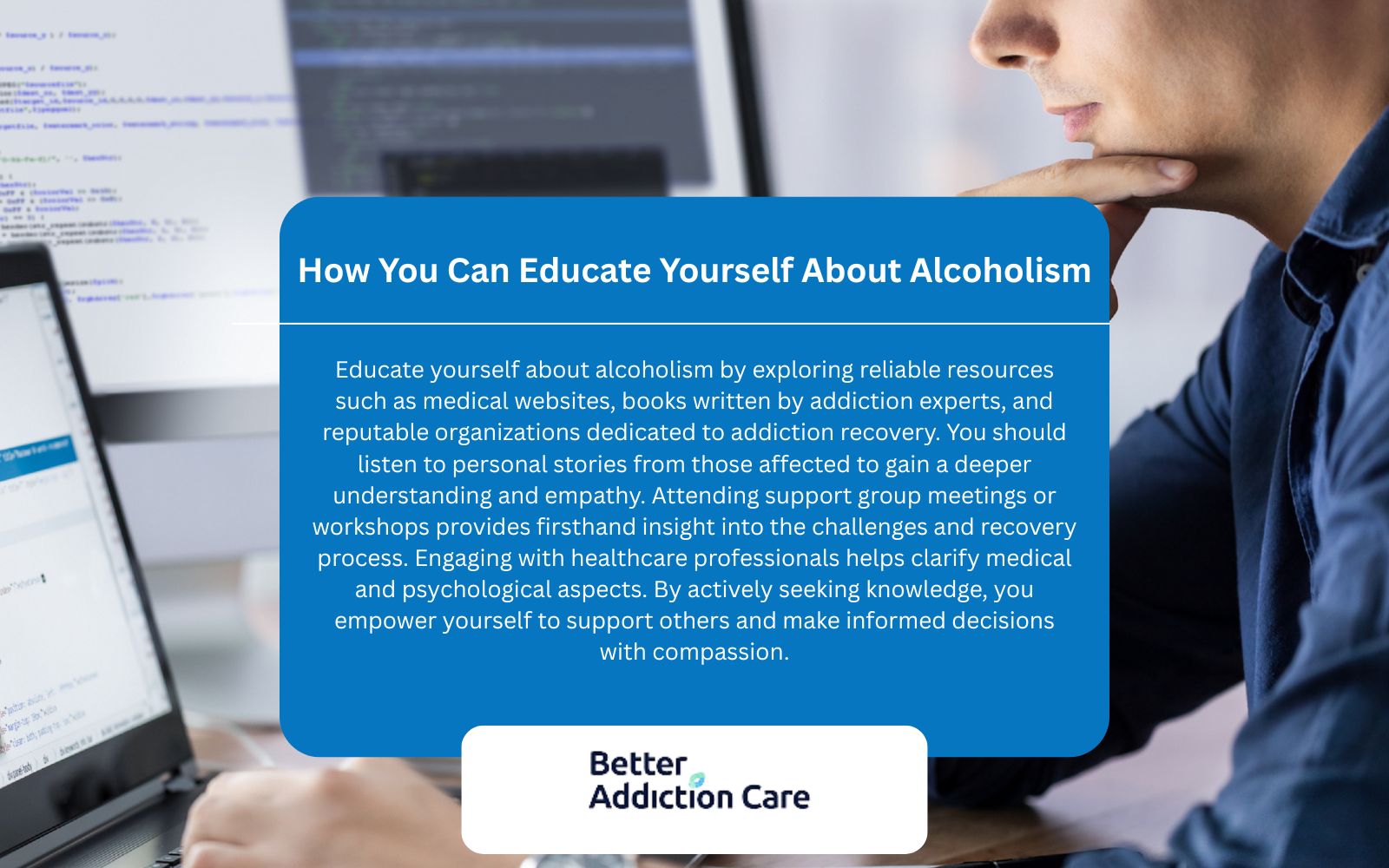
Educate yourself about alcoholism by exploring reliable resources such as medical websites, books written by addiction experts, and reputable organizations dedicated to addiction recovery. You should listen to personal stories from those affected to gain a deeper understanding and empathy. Attending support group meetings or workshops provides firsthand insight into the challenges and recovery process. Engaging with healthcare professionals helps clarify medical and psychological aspects. By actively seeking knowledge, you empower yourself to support others and make informed decisions with compassion.
What Should You Not Say if You Are Trying to Help an Alcoholic Friend?
If you are trying to help a friend struggling with alcohol, you should not say anything that shames, criticizes, or pressures them. Support starts with your words and attitude. Stay compassionate, not confrontational.
Avoid negative comments about their drinking habits. Instead of judging, focus on understanding their situation. Condemning or moralizing usually shuts down communication and builds walls where bridges are needed.
Never downplay the emotions or experiences your friend shares. Validate their feelings, even when you don’t fully understand. Dismissing their concerns weakens trust and makes recovery feel even more isolating.
Stay away from ultimatums or threats. Demands tend to damage relationships rather than drive positive change. Encouragement works far better than control.
Criticism and blame have no place in a supportive conversation. Alcoholism is a disease, not a moral failing. Replace judgment with empathy and reinforce their strengths.
Avoid enabling behaviors—don't make excuses for them, cover up the consequences of their drinking, or provide access to alcohol. Encouraging healthier habits and setting firm boundaries helps protect your relationship and their progress.
Create an environment rooted in patience and respect. A supportive tone and consistent, healthy boundaries increase the chance that your friend will seek help and take steps toward recovery. Learning what to say can make a significant difference in their journey.
What to Do and What Not to Do When Supporting Someone Struggling with Alcohol?
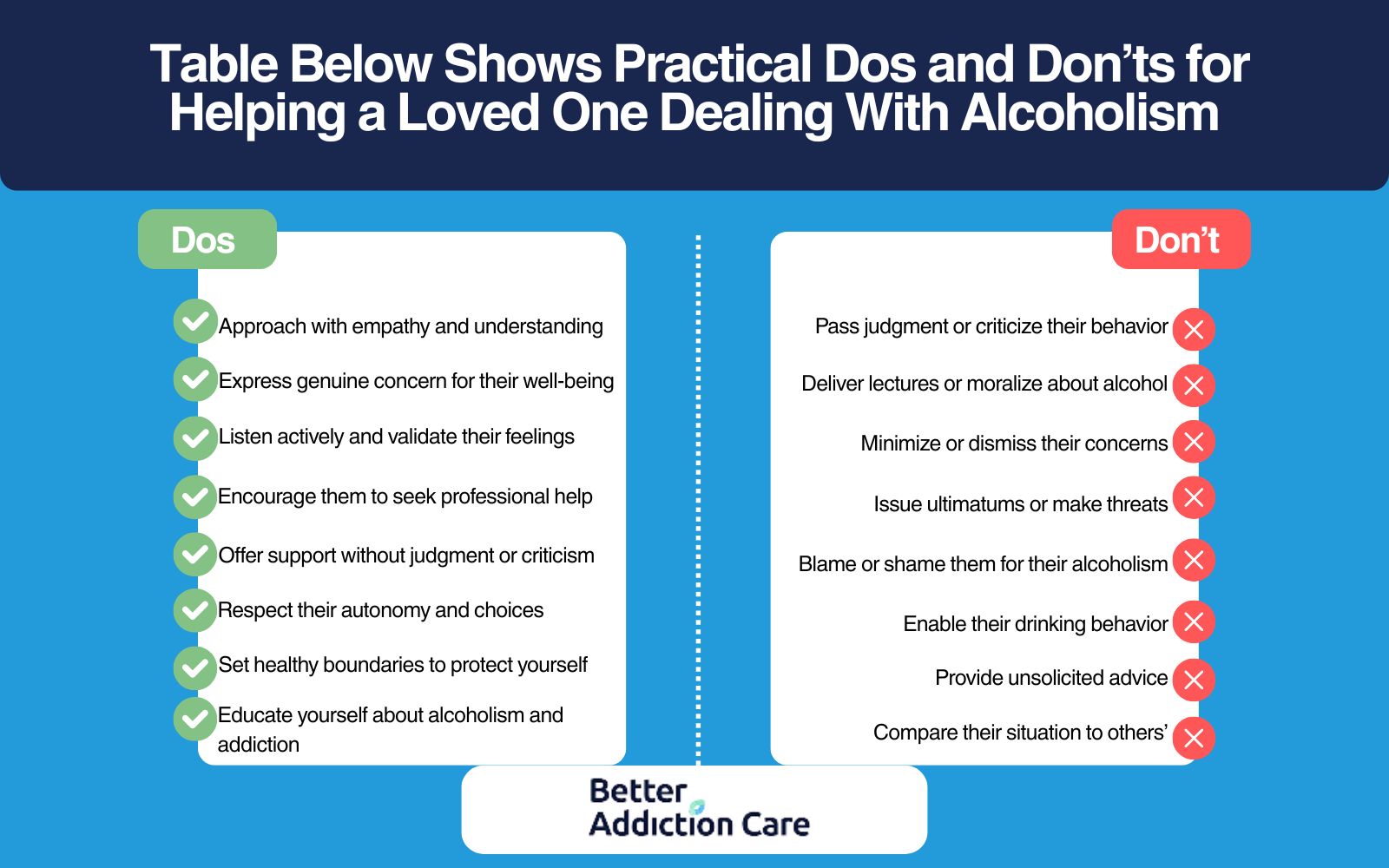
When supporting someone struggling with alcohol, focus on offering empathy, active listening, and encouragement to seek professional help while respecting their autonomy and setting healthy boundaries. Avoid judgment, criticism, unsolicited advice, enabling behaviors, or actions that minimize or dismiss their struggles.
The table below shows practical dos and don’ts for helping a loved one dealing with alcoholism:
|
What to Do |
What Not to Do |
|
Approach with empathy and understanding |
Pass judgment or criticize their behavior |
|
Express genuine concern for their well-being |
Deliver lectures or moralize about alcohol |
|
Listen actively and validate their feelings |
Minimize or dismiss their concerns |
|
Encourage them to seek professional help |
Issue ultimatums or make threats |
|
Offer support without judgment or criticism |
Blame or shame them for their alcoholism |
|
Respect their autonomy and choices |
Enable their drinking behavior |
|
Set healthy boundaries to protect yourself |
Provide unsolicited advice |
|
Educate yourself about alcoholism and addiction |
Compare their situation to others’ |
What Are 10 Ways to Start a Conversation with a Friend Who Is Struggling with Alcoholism?
Here are 10 ways to start a conversation with a friend who is struggling with alcoholism:
-
Hey, can we have a chat? I've noticed you've been improving your drinking habits lately, and I'm very glad to see this advance for your well-being.
-
I have a lot of love and concern for you, and I've been watching your drinking habits lately.
-
I'm excited to see the positive changes in your behavior after you stop drinking, and I'm here to support you if you ever need someone to talk to.
-
I'm here for you, and I'm excited to listen if you ever want to talk about your drinking.
-
I can't wait to chat about something important with you. I'm worried about you and your drinking patterns lately.
-
I'm quite concerned about how much alcohol you've been drinking, and I want to make sure you're doing okay.
-
Hey, I don't know what you think, but your drinking is making things worse in your life, and I'd love to help you.
-
I like you, and I'm always here for you if you ever want to talk about drinking or anything else.
-
I'm here for you no matter what. If you're having problems with drinking, you can talk to me; I care about your health.
-
Hi there, I meant to talk to you about some concerning things.
What Are The Available Treatment Options for Alcohol Use Disorder?
The available treatment options for alcohol use disorder include medication-assisted treatment, behavioral therapies, and structured support programs. FDA-approved medications like naltrexone reduce cravings and block alcohol's euphoric effects, while acamprosate stabilizes brain chemistry and disulfiram creates unpleasant reactions when drinking. Behavioral therapies such as Cognitive Behavioral Therapy (CBT) help individuals identify triggers and develop healthy coping strategies.
Treatment settings range from inpatient rehabilitation programs that provide 24/7 medical supervision to outpatient programs that allow individuals to maintain daily responsibilities while receiving care. Support groups like Alcoholics Anonymous (AA) offer peer-led community support and long-term accountability. Medical detoxification ensures safe withdrawal management under professional supervision. The most effective approach to treating alcohol use disorder combines multiple treatment modalities tailored to each person's specific needs and circumstances.
How To Help An Alcoholic Friend Look for Rehab Centers?
To help an alcoholic friend look for rehab centers, start by researching facilities in their area and gathering recommendations from trusted sources. Focus on comprehensive programs that include therapy, counseling, medical treatment, and aftercare support. Present your findings in a supportive, non-judgmental manner, discussing the benefits, services, treatment approaches, and success rates of each facility. Offer to accompany them during visits and provide both emotional and practical support throughout the decision-making process.
Ensure your friend remains actively involved in choosing their treatment center, as personal comfort and connection with the facility are crucial for recovery success. Respect their final decision regardless of which rehab centers they select, and continue providing unwavering support and encouragement. Once they begin treatment, maintain regular contact to check on their progress and offer ongoing assistance as they work toward recovery and improved health
Related Articles
Treatment Centers in Georgia








